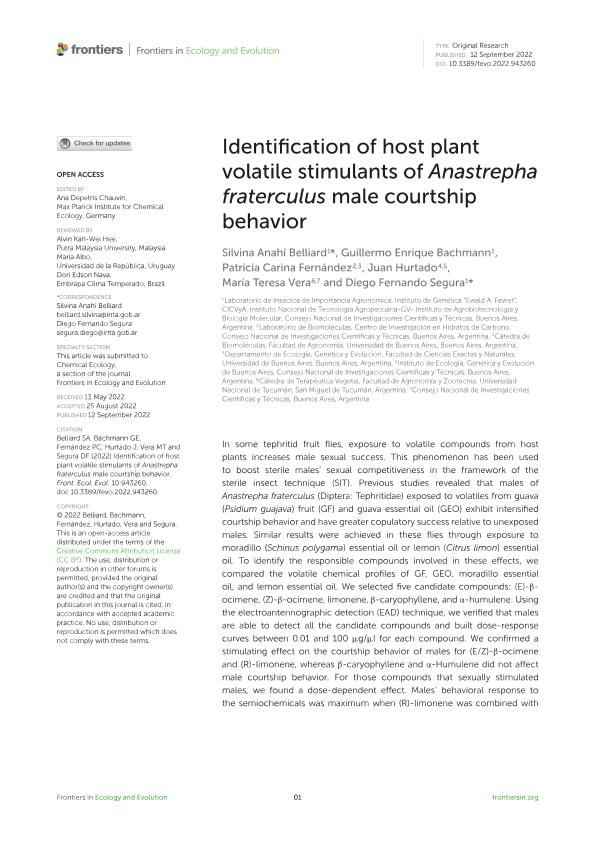Artículo
Identification of host plant volatile stimulants of Anastrepha fraterculus male courtship behavior
Belliard, Silvina Anahí ; Bachmann, Guillermo Enrique
; Bachmann, Guillermo Enrique ; Fernandez, Patricia Carina
; Fernandez, Patricia Carina ; Hurtado, Juan Pablo
; Hurtado, Juan Pablo ; Vera, María Teresa
; Vera, María Teresa ; Segura, Diego Fernando
; Segura, Diego Fernando
 ; Bachmann, Guillermo Enrique
; Bachmann, Guillermo Enrique ; Fernandez, Patricia Carina
; Fernandez, Patricia Carina ; Hurtado, Juan Pablo
; Hurtado, Juan Pablo ; Vera, María Teresa
; Vera, María Teresa ; Segura, Diego Fernando
; Segura, Diego Fernando
Fecha de publicación:
09/2022
Editorial:
Frontiers Media
Revista:
Frontiers in Ecology and Evolution
ISSN:
2296-701X
Idioma:
Inglés
Tipo de recurso:
Artículo publicado
Clasificación temática:
Resumen
In some tephritid fruit flies, exposure to volatile compounds from host plants increases male sexual success. This phenomenon has been used to boost sterile males’ sexual competitiveness in the framework of the sterile insect technique (SIT). Previous studies revealed that males of Anastrepha fraterculus (Diptera: Tephritidae) exposed to volatiles from guava (Psidium guajava) fruit (GF) and guava essential oil (GEO) exhibit intensified courtship behavior and have greater copulatory success relative to unexposed males. Similar results were achieved in these flies through exposure to moradillo (Schinus polygama) essential oil or lemon (Citrus limon) essential oil. To identify the responsible compounds involved in these effects, we compared the volatile chemical profiles of GF, GEO, moradillo essential oil, and lemon essential oil. We selected five candidate compounds: (E)-β-ocimene, (Z)-β-ocimene, limonene, β-caryophyllene, and α-humulene. Using the electroantennographic detection (EAD) technique, we verified that males are able to detect all the candidate compounds and built dose-response curves between 0.01 and 100 μg/μl for each compound. We confirmed a stimulating effect on the courtship behavior of males for (E/Z)-β-ocimene and (R)-limonene, whereas β-caryophyllene and α-Humulene did not affect male courtship behavior. For those compounds that sexually stimulated males, we found a dose-dependent effect. Males’ behavioral response to the semiochemicals was maximum when (R)-limonene was combined with (E/Z)-β-ocimene, but the response was reduced when β-caryophyllene and α-humulene were included, which suggests some sort of negative interaction between them. Our results may contribute to the ongoing development of the SIT in this species.
Archivos asociados
Licencia
Identificadores
Colecciones
Articulos(CCT - NOA SUR)
Articulos de CTRO.CIENTIFICO TECNOL.CONICET - NOA SUR
Articulos de CTRO.CIENTIFICO TECNOL.CONICET - NOA SUR
Articulos(CIHIDECAR)
Articulos de CENTRO DE INVESTIGACIONES EN HIDRATOS DE CARBONO
Articulos de CENTRO DE INVESTIGACIONES EN HIDRATOS DE CARBONO
Citación
Belliard, Silvina Anahí; Bachmann, Guillermo Enrique; Fernandez, Patricia Carina; Hurtado, Juan Pablo; Vera, María Teresa; et al.; Identification of host plant volatile stimulants of Anastrepha fraterculus male courtship behavior; Frontiers Media; Frontiers in Ecology and Evolution; 10; 9-2022; 1-15
Compartir
Altmétricas



